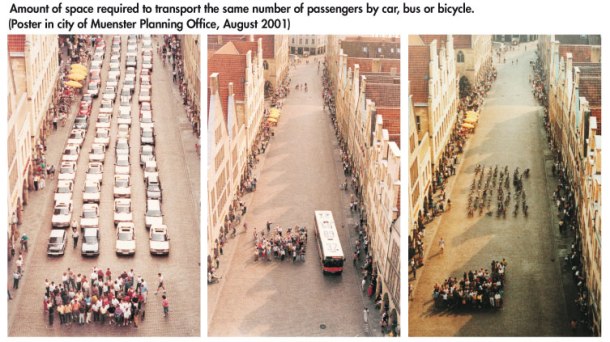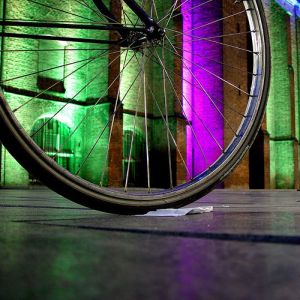This may come as a surprise, but the future of transportation has been around for two centuries already. Of course, back when ol’ Baron Karl first put two wheels together and rode them around 1817 Mannheim, he just thought he’d made a kind of a re-usable horse. He certainly had no idea his invention would come to shape the future of the information age.
Even as recently as my own childhood, I couldn’t have guessed bikes would be ever be such a big deal. At the time, they only seemed useful to younger teens, as a faster alternative to walking. For anyone age 16 or over, on the other hand, our car-obsessed society insisted that there was only one respectable ride to have. And sure enough, I didn’t see any adults riding bikes, outside of the occasional oddball college professor.
But according to current trends, bikes are making the move from kid’s play to serious business. Over the past 40 years, world bicycle production has grown 300% faster than car production (source). In Paris alone, over 100,000 people per day take advantage of Vélib, the bicycle sharing service. Right here in Boston, the Hubway bike system has been up and running for a year now. And if you’re still not convinced, I did a search on just one week’s worth of recent news, and turned up bike-sharing programs being planned in Montgomery, MD; Vancouver, BC; and Philadelphia, PA.
So what gives? Why all the sudden love for our two-wheeled friends? Well, bikes may not have changed much over 200 years, but the rest of the world certainly has. Now is the perfect time to put bikes at the center of planning and development, and here are 5 reasons why:

1. The world is urbanizing.
As I’ve discussed here and there, the world’s population is moving into cities. The surge in density will have many ramifications, one of the most annoying of which is increased traffic. It’s not much of a stretch to picture half the world stuck in an eternal traffic jam. But imagine, instead, if this newly urbanized populace chooses bicycles. Since a bike’s profile is many times smaller than a car’s… presto! Road capacity goes up, and commute time goes down, with only minimal investment in infrastructure.
2. Paying for gas sucks.
Whether on the macro level (our dependence on the Middle East) or on the micro level (pain at the pump), paying for gas is no one’s idea of a good time. After all, that’s about $2,000 last year that you could have spent on something else. Bicycles, of course, cost virtually nothing to use.
3. Bikes are climate-neutral.
Rising temperatures and wild weather fluctuations will lead to receding coastlines, terrible storms and outbreaks of disease. But for every bike that gets on the road, a carbon-belching car will be left in the garage. For example, Hubway, the Boston bike-share I mentioned earlier, has already kept 240,000 lbs of carbon out of the air.
4. Peak oil is coming.
It is literally impossible for there to be an unlimited supply of oil in the world, and that means we’ll eventually run out. Bikes reduce our dependence on the sweet, sticky black stuff, giving us a cushion as we figure out how to wean ourselves off. For that matter, even subways, buses and electric vehicles, however efficient, are usually powered by something non-renewable at the end of the day. But bikes are you-powered.
5. Obesity is harmful.
I don’t know about the rest of the world, but in America today two trends are clearly manifest: One, we as a nation are becoming more obese over time. Two, obesity can be pretty bad for you. It’s likely a side-effect of our transition to an information-based economy – it’s hard to burn calories sitting at a desk. Or perhaps the scourge of cheap, fake food is finally exacting a toll. In any case, a populace that’s getting regular exercise just by going to work will surely be healthier – and happier.
So that’s why I think our future should be one full of bicycles. What do you think – will bikes ever beat cars? Will it make a difference? And how often do you ride a bike now? Speak up in the comment box, or ask your friends using the sharing buttons!

I have no doubt the number of bicycles in urban areas is (and arguably should) increase, space and ease of commute being major drivers (punny!) However, there are some issues that represent significant barriers.
1. Hauling stuff: having had a bike as my primary transportation for a few years, I frequently found even getting groceries to be problematic. Manageable, but annoying. Perhaps a more reliable, and culture normalized business like zipcar would alleviate the problem, but it was painful to spend $15 more for the privilege of not carrying groceries.
2. Bikes are not free. I have found that, with doing all of my own maintenance, a bike would cost me about $150-$200 a year to own and operate. Cheaper than a car to be sure, but not free. Include the problem of storage (potential cost / hassle) and theft issues (potential cost) and the price can add up.
3. While undoubtedly an improvement upon what they replace, bikes still might not be carbon neutral. Manufacturing, shipping and maintenance would all factor in. It would be interesting to know how they fair.
Thanks for reminding us about the manufacturing footprint and maintenance costs! Both are in fact non-zero, which I did not factor into my analysis. However, I still feel pretty confident that they’re an order of magnitude smaller than they would be for a car.
The challenge of hauling stuff is more difficult to address. Perhaps if big-box grocery stores gave way to smaller, more local markets that you could stop at more frequently, a bicycle would be more practical. A centralized delivery system (like Peapod) is another possible solution. In any case, I certainly don’t think we can build a transportation infrastructure based ONLY on bicycles. I’d just like them to occupy a much larger share than they do now.
Thanks for bringing your urban biking experience to the conversation!
Agreed that bikes certainly do have a cost (maintenance, production, shipping), but as Scott said it’s definitely cheaper by a substantial amount.
As far as cargo goes I haven’t had any problems. I usually do groceries once a week. I have two of these(http://goo.gl/dzB4u) on the back of my “errand” bike and I find they can easily fit $60 worth of groceries, 80 if you’re good a tetris. If your loads are larger than that you can get a trailer for your bike. Here’s a google image search for bike trailers just for some examples: http://goo.gl/ccctj
Bikes are great, but you have to learn how to ride one to use one. How’s that going for you Scott? 🙂
Yeah, yeah, yeah, it’s true. I talk the talk but don’t bike the bike. I guess I have some work to do on the whole leading-by-example thing. Hey, at least I walk a lot!
Pingback: Bicycles are our ride to the future! | You Break, You Buy, You Pollute, You Die.